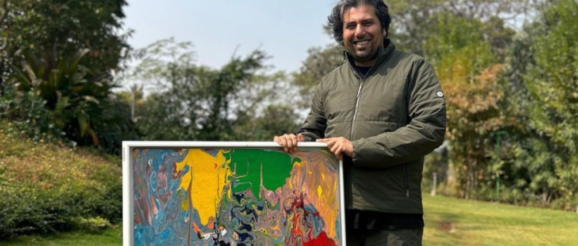#CryptoExplained: Suril Desai Believes That Current Regulations Are Restricting Innovation in India, But Indian Innovators Will Find a Way to Change the World


Suril Desai has been at the forefront of Crypto regulation in India. He was a part of the Supreme Court Case that overturned the effective ‘Ban’ on crypto. As leader of Nishit Desai’s technology practice, he is consistently on the forefront of technology and its impact on regulation. He is by far one of India’s thought leaders advocating for paradigm shifts in regulatory mental models to support a technologically advanced civilization.
Suril is also a Renaissance man and is an Artist and writer. His next art show will only accept Bitcoin in exchange for his paintings. Look forward to that.
We will begin with an excerpt from Suril’s Poem to Bitcoin:
Bitcoin Love
With bitcoins it was love at first sight
It’s rebellious nature got me attracted
My heart told me follow without doubt
The journey began 8 years ago
And continues till this day
Still very fresh and volatile
But that only makes me love you more
I remember when you were worthless
And no one believed in you
Thought you were a Ponzi scheme
Called you a tool for the criminals
You were written off and disregarded
Yet your virtues amazed me
The freedoms you promised
Seemed impossible at first
But the white paper convinced me
Today when you are worth so high
You bring more than just joy in my life
I will forever be indebted to you
This is an edited version of the interview.
What got you excited about crypto and led you to discover Bitcoin?
Suril: I actually discovered crypto when I was researching privatization of space exploration back in 2008. A colleague told me to look into Bitcoins, and though I had no idea what it was, I started researching and reading up on it.
What aspects of Bitcoin appealed to you the most during your initial research?
Suril At first, Bitcoin’s association with the dark web and illicit activities made me skeptical, but when I read the white paper in 2012, I got excited about its potential as an alternative to the traditional banking system. The idea of a global, algorithm-backed, consensus-based currency fascinated me.
How did your journey with Bitcoin progress from there, and how did you get involved in the Indian crypto industry?
Suril: In December 2013, I attended India’s first Bitcoin conference and met early adopters and players in the crypto industry. As the regulatory situation became uncertain, I hosted a press conference, and my law firm got involved in legal research on Bitcoins. We represented the case for Bitcoins to the enforcement directorate and started writing consulting papers on crypto.
How did the 2008 financial crisis influence your perception of Bitcoin, and why did you see it as an alternative to the traditional banking system?
Suril: The 2008 financial crisis had a significant impact on how I and many others perceived Bitcoin. We saw it as an alternative to the centralized banking system, backed by an algorithm and providing a more efficient and transparent way of conducting cross-border transactions. It seemed like a promising open-source hedge fund that could help people hedge against inflation and provide more financial accessibility for those on the fringes of society.
What are your thoughts on central bank digital currencies (CBDCs) and their relation to cryptocurrencies?
Suril: I think CBDCs can coexist with cryptocurrencies, but they are still debt-backed currencies. While I don’t oppose them, having an ecosystem of cryptocurrencies around CBDCs would make the digital currency more effective. However, achieving a global consensus on crypto regulations would be challenging due to each country’s unique nuances.
How do you see the evolution of crypto in India over the next few years, considering the current tax and regulatory treatment?
Suril: India’s tax regime on crypto, particularly the 1% TDS on each trade, is causing issues for traders, leading many to move out of the country. The strict taxation and regulations have driven away talent and stifled innovation. If India wants to position itself as an IT capital, it needs to be more accommodating and facilitate crypto innovations.
What are your thoughts on India’s tax and regulatory treatment of crypto?
Suril: I believe India’s taxation on crypto, especially the 30% capital gains tax and 1% TDS, is hindering growth in the crypto and web three industry. The strict tax regime is driving away talent and causing a brain drain of Indian innovators who seek more crypto-friendly environments elsewhere.
Where do you think Indian innovators should focus their efforts in the crypto and web three space?
Suril: India has a vast pool of talented programmers and IT professionals. However, the current regulatory environment makes it difficult for them to innovate in the crypto and Web3 space. Indian innovators should focus on developing products and technologies in these areas, but it’s crucial to address the legal uncertainties to enable them to concentrate on their innovations. A collective voice and association to advocate for a more positive approach from the government would be beneficial.
In the current hostile environment, what can crypto innovators do to help the crypto space or build within it in India?
Suril: Despite the barriers they face, crypto innovators can still flourish. Innovation thrives in challenging times, like a lotus blossoming in muddy waters. They need to focus on their products and technologies, while also advocating for a more positive approach from the government. Forming a collective voice and association that includes traders and the crypto community will help present a stronger case to the government.
How can Indian innovators use the legal system to their advantage in the crypto space?
Suril: The 2020 Supreme Court judgment against the Reserve Bank of India, which opposed the crypto ban, can be used as a reference point. Crypto community members should study and understand this landmark judgment. Additionally, filing another Public Interest Litigation (PIL) with a diverse group, including traders and the web three community, could help advocate for a more favorable legal environment for crypto in India.
What measures can be taken to create a more crypto-friendly environment in India?
Suril: Organizing a large-scale crypto and web three conference could be a significant step to bring together stakeholders from the government, industry, and business. Such a platform would facilitate discussions, educate the government about the potential of the technology, and promote better understanding of the crypto protocols. A collective effort will help further the cause for the industry in India.
How can the Indian crypto community come together to strengthen its position and advocate for positive change?
Suril: The community should unite, not just relying on exchanges but including traders, developers, and web three enthusiasts. Forming an association or group that represents all these voices will enable a stronger advocacy effort. It will help ensure that the government hears the perspectives of the average crypto user and the benefits this technology can bring to the country.
How can crypto help the creator economy, and how does it benefit artists and musicians?
Suril: Crypto, particularly NFTs, already plays a role in the creator economy. For big-name musicians, creating and selling NFTs with special privileges can be lucrative. However, beyond that, crypto offers opportunities for artists to protect their copyrights and intellectual property through blockchain mechanisms. Smart contracts will likely become a key aspect of the creative community, facilitating collaborations and secure payment of royalties.
How do you foresee the global evolution of the crypto ecosystem over the next five years, and how can India leverage this development?
Suril: Over the next five years, crypto is expected to become more widely accepted and accessible globally. It will continue to prove itself as a valuable store of value and become instrumental in regions with struggling economies and hyperinflation. The adoption of decentralized exchanges and the growth of decentralized autonomous organizations (DAOs) are expected. India should embrace crypto’s potential and strive for clarity in regulations to foster its growth.
What role can smart contracts play in the creative industry, and how can they benefit creators?
Suril: Smart contracts hold immense potential for the creative industry by safeguarding intellectual property and facilitating collaboration. Creators can utilize smart contracts to ensure fair payment of royalties and streamline their businesses. As the technology becomes more user-friendly, its adoption is likely to increase, benefiting creators by providing more secure and efficient means to manage their creative work.
What message would you like to convey to the government about the importance of embracing crypto in India?
Suril: Banning or excessively taxing crypto is not the solution. The government needs to recognize that crypto is not a zero-sum game and that it offers practical solutions for various sectors, such as implementing welfare programs or rationing systems. Instead of fearing crypto, the government should explore how it can harness its potential to improve the nation’s overall well-being and economic development.
The post #CryptoExplained: Suril Desai Believes That Current Regulations Are Restricting Innovation in India, But Indian Innovators Will Find a Way to Change the World appeared first on Rolling Stone India.
